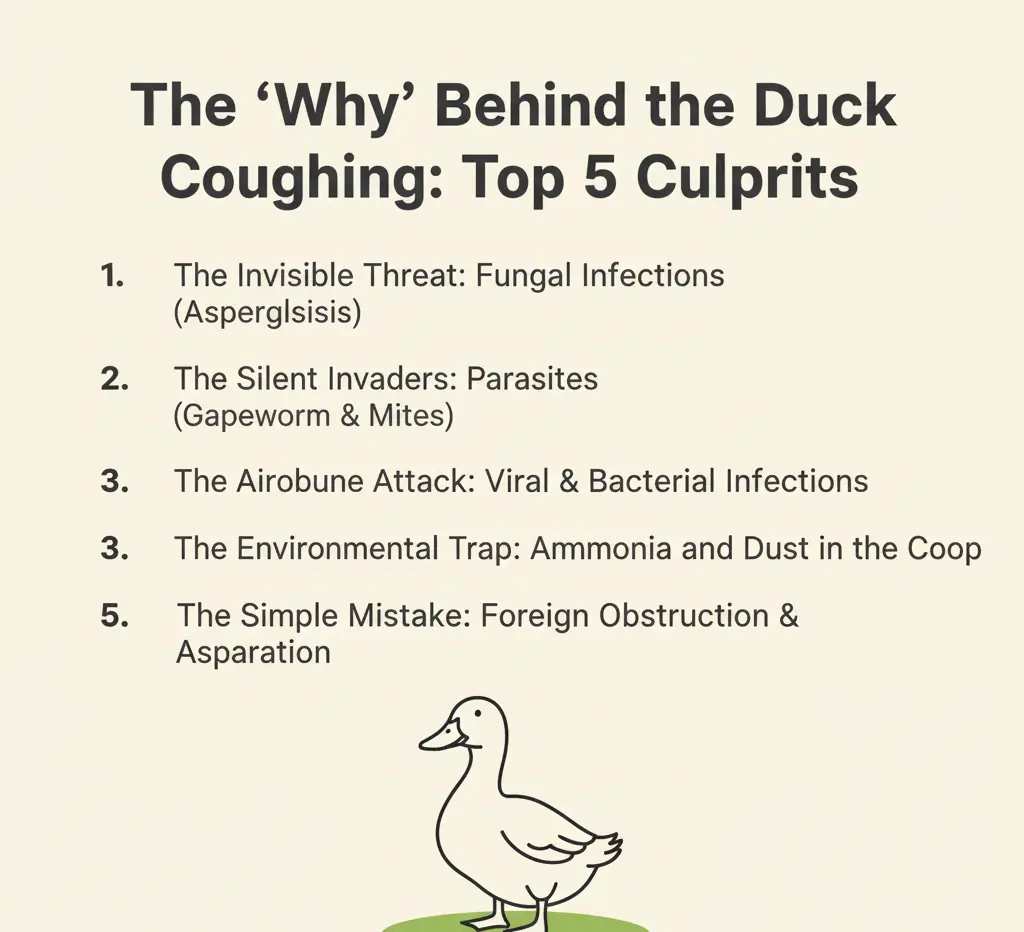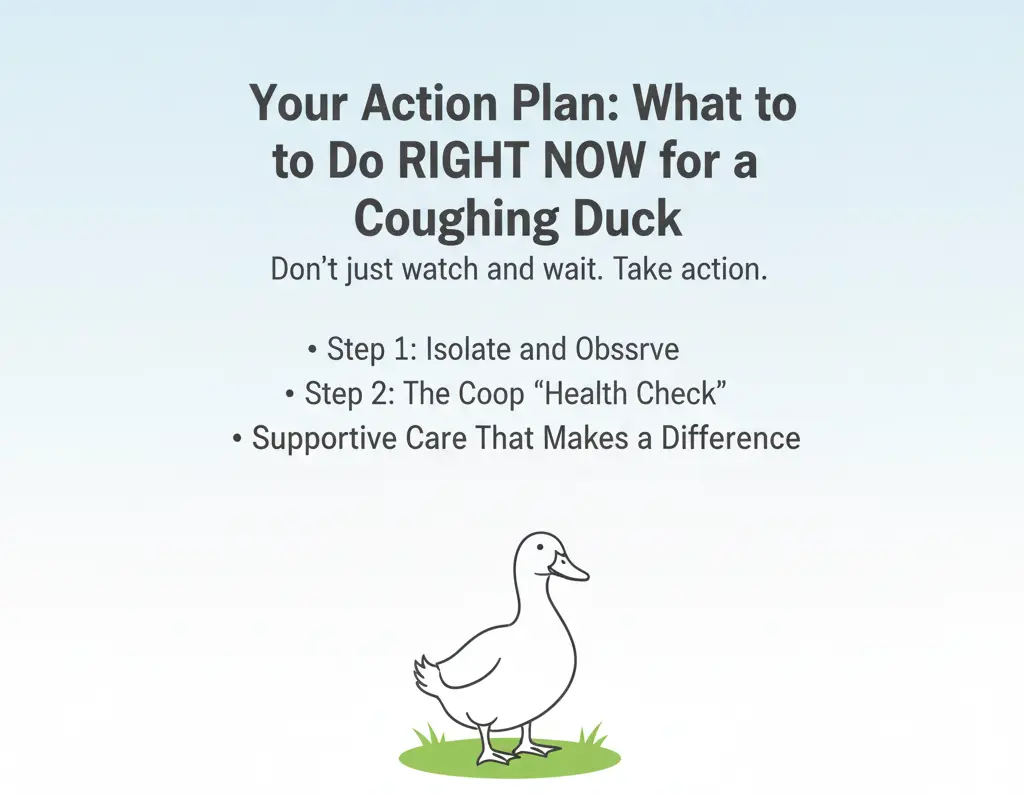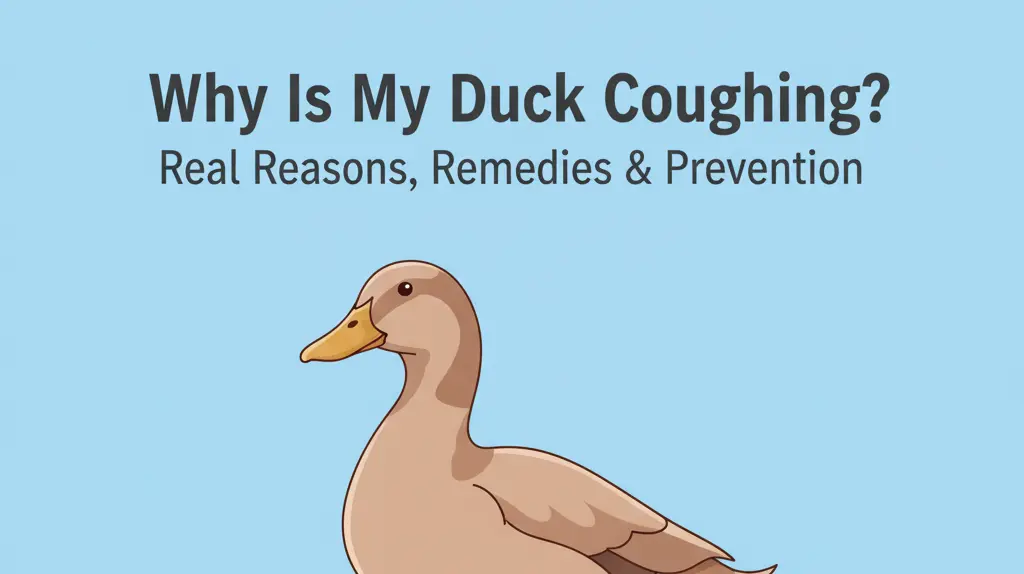I hear it all the time.
That gut-wrenching moment you hear a weird sound from the coop.
It’s not the usual happy quacking. It’s a harsh, rasping, persistent cough.
If you’re worried about your duck coughing, you’re in the right place. I’ve spent over two decades raising poultry, and that audible signal is your bird’s way of screaming for help. Let’s get straight to what it means and what to do about it.
Is My Duck Actually Coughing or Is It Something Else?
First, let’s get clarity.
Ducks don’t cough like we do. Their respiratory system is a unique, one-way street of air sacs and lungs.
A “cough” is often a symptom of a deeper issue in their airway.
Decoding the Sounds: Cough vs. Sneeze vs. Wheeze
It’s easy to get these mixed up.
- Coughing: A sharp, dry, or moist hacking sound. Often involves the duck extending its neck. This points to an irritation deep in the trachea or lungs.
- Sneezing: A quick puff of air from the nares (nostrils). You might see a slight nasal discharge. This is usually an issue in the upper nasal passages.
- Wheezing or Gurgling: A high-pitched or bubbly sound on inhalation or exhalation. This signals a serious obstruction or fluid in the airway.
- Gaping: The duck holds its mouth open, panting, struggling for oxygen. This is a red alert.
Telltale Symptoms to Watch For
A duck coughing is rarely the only sign of trouble.
Look for a cluster of symptoms to get the full picture.
- Lethargy and weakness.
- Nasal or eye discharge (mucus).
- Swollen eyes, face, or sinus area.
- Reduced appetite and intake of water.
- Messy, pasted feather area around the nose or face.
- A change in their droppings or faeces.
- Panting even when not hot.
The “Why” Behind the Duck Coughing: Top 5 Culprits
I’ve seen it all.
Usually, the coughing comes down to one of these five culprits.

#1 The Invisible Threat: Fungal Infections (Aspergillosis)
This is the big one.
Aspergillosis is a nasty fungal disease caused by Aspergillus mold spores.
Your duck gets it from inhalation of these spores from damp, moldy bedding like wet straw, shavings, or hay. It can even be in moldy feed.
The fungus creates plaques in the air sacs and lungs, causing severe respiratory distress. The condition is brutal and requires immediate veterinary care and antifungal medications like Itraconazole.
#2 The Silent Invaders: Parasites (Gapeworm & Mites)
Internal parasites can literally choke a bird from the inside out.
- Gapeworm (Syngamus trachea): These tiny red worms attach to the trachea (windpipe), causing a blockage. Your duck will be gaping, stretching its neck, and making a coughing sound. The larvae are often ingested from earthworms, slugs, or snails. A fecal inspection and deworming with anthelmintics like fenbendazole is the solution.
- Tracheal Mites (Sternostoma tracheacolum): These microscopic parasites cause an infestation in the respiratory system, leading to irritation, mucous buildup, and that telltale cough. A vet can diagnose this, and treatment often involves ivermectin or moxidectin.
#3 The Airborne Attack: Viral & Bacterial Infections
Your flock is vulnerable to contagious pathogens.
A bacterial infection like Pneumonia, Avian Cholera (Pasteurella multocida), or Mycoplasma can cause coughing, fever, and sinus congestion.
Viral threats like Avian Influenza (birdflu) or Duck Plague (Duck Viral Enteritis) are even more serious. These are highly contagious and often come with nasal discharge, swelling, and even neurological symptoms. Biosecurity is your only real defense here.
#4 The Environmental Trap: Ammonia and Dust in the Coop
Sometimes, the enemy is the very environment you provide.
High ammonia levels from a buildup of manure and moisture create toxic vapors. This gas is a powerful irritant to the respiratory system, causing inflammation, swelling, and a chronic cough.
Excessive dust from dry bedding or poor-quality feed also causes irritation. Think of it like living in a constant dust storm—it damages the delicate lining of the trachea and lungs.
#5 The Simple Mistake: Foreign Obstruction & Aspiration
Ducks are curious and love foraging.
Sometimes they inhale a piece of bedding, a large piece of feed, or even sand or quills. This foreign object creates an obstruction in the airway, leading to violent coughing and panting.
Aspiration is another risk, where water or moist feed goes down the trachea instead of the esophagus, often when trying to swallow too quickly or if being given liquid medicine improperly with a funnel. This can lead to pneumonia.
Your Action Plan: What to Do RIGHT NOW for a Coughing Duck
Don’t just watch and wait.
Take action.

Step 1: Isolate and Observe
The moment you spot a sick bird, quarantine it. This protects the rest of your flock from a potentially contagious disease and reduces the sick duck’s stress. Observe its breathing, behavior, appetite, and droppings.
Step 2: The Coop “Health Check”
Go inspect the coop immediately.
- Smell: Does it reek of ammonia?
- Feel: Is the bedding damp or wet?
- Look: Do you see any visible mold or fungi?
- Airflow: Is it stuffy? You need good ventilation and aeration without drafts.
Step 3: Supportive Care That Makes a Difference
This is your supportive therapy. While you figure out the cause, provide immediate comfort.
- Cleanliness: Put the isolated duck in a clean, dry, warm space with fresh bedding.
- Hydration: Provide fresh, clean water. Add a splash of probiotics or electrolytes to support its immune system and maintain homeostasis. Proper hydration is key to thinning mucous.
- Nutrition: Offer high-quality feed. If its appetite is reduced, try tempting it with moist feed, chopped herbs like oregano, or a nutrient-rich mash.
- Warmth: Ensure the duck maintains its body temperature. A safe heat source can help it conserve energy.
Long-Term Prevention: How to Stop Duck Coughing for Good
An ounce of prevention is worth a pound of cure.
Building a “Fort Knox” Coop: Ventilation & Cleanliness
Your housing is your first line of defense.
- Ventilation is King: Ensure constant, fresh airflow to remove ammonia and humidity. Vents should be high up, above the ducks’ level, to avoid drafts.
- Dry Bedding is Non-Negotiable: Use deep, absorbent bedding (like pelletized bedding or sand) and remove wet spots daily. Never let moisture or faeces buildup.
- Avoid Overcrowding: Give your birds space. Overcrowding increases stress, moisture, and the transmission of pathogens.
- Routine Disinfectant: Regularly clean and disinfect your coop, waterers, and feeders.
Fueling Their Immunity: The Power of Proper Nutrition
A strong immune system fights off infection.
- Balanced Diet: Provide a quality poultry feed appropriate for their age.
- Mineral and Vitamin Intake: Ensure they get key nutrients. A deficiency in vitamins like A can weaken the respiratory system.
- Probiotics and Enzymes: Supplementing with probiotics supports gut health, which is the foundation of immunity. Enzymes aid the digestive system.
- Herbal Support: Natural herbs like oregano and thyme have antimicrobials properties that can boost wellness.
Conclusion: Your Duck’s Health is in Your Hands
Hearing a duck coughing can be terrifying, but it’s a clear signal that demands action, not panic.
By understanding the difference between a cough, a sneeze, and a wheeze, you can start to pinpoint the cause—whether it’s a fungal infection, a nasty parasite, or an environmental issue like ammonia in the coop.
Your best tools are observation and preventive management. A clean, dry habitat, excellent ventilation, and proper nutrition are the pillars of a healthy flock. Never ignore the symptoms of a respiratory infection.
Taking swift, decisive action is the best way to ensure the long-term health and well-being of your feathered friends, preventing a mild issue from becoming a chronic condition or a tragic collapse. This is how you address duck coughing for good.
Frequently Asked Questions (FAQs)
Q: Why is my duck coughing like it’s choking?
Likely an obstruction or gapeworm. Check for food stuck in the throat or use dewormers.
Q: Can a duck recover from a respiratory infection on its own?
It’s highly unlikely. A respiratory infection, whether bacterial, viral, or fungal, almost always requires intervention. Supportive care helps, but a veterinary diagnosis and the right treatment (like antibiotics or antifungals) are often necessary for recovery.
Q: Is duck coughing contagious to other ducks?
Yes. Viral and bacterial diseases spread quickly in a flock. Isolate any coughing duck.
Q: What are some natural remedies for a duck’s cough?
While not a cure, some herbal remedies can offer supportive therapy. A mild decongestant effect can be achieved with steam (placing the duck in a steamy bathroom for 10-15 minutes). Adding a tiny bit of honey or nectar to their water can soothe an irritated throat. Herbs like oregano in their feed can offer holistic immune support. These are not a substitute for veterinary care.
Q: Can ducks get colds like humans?
Not exactly. Duck coughing usually comes from infections, parasites, or environmental issues—not the typical human cold virus.
Q: How can I improve ventilation in my duck coop?
Good ventilation exchanges stale, humid air for fresh air without creating a draft on your ducks. Cut vents near the roofline of the coop, as hot, moist, ammonia-filled air rises. Ensure you have vents on opposite sides for cross-ventilation. This will improve airflow and reduce the buildup of pollutants.
Q: Can poor bedding cause duck coughing?
Yes. Moldy straw, hay, or damp bedding can cause fungal infections like aspergillosis.
Q: Is duck coughing contagious to other birds in my flock?
Yes, it can be extremely contagious. If the cause is viral (like Avian Influenza) or bacterial (like Mycoplasma), it can spread rapidly through airborne droplets or contaminated surfaces. This is why immediate quarantine of any infected bird is the most critical step in containment.
Q: What natural remedies work for duck coughing?
Honey water, probiotics, herbal teas, and steam therapy can ease mild symptoms—but always follow up with veterinary care if symptoms persist.
Sources & References:
- https://www.merckvetmanual.com/poultry/aspergillosis/aspergillosis-in-poultry
- https://poultry.extension.org/articles/poultry-health/common-poultry-diseases/gapeworm-in-chickens-and-other-poultry/
- https://www.vet.cornell.edu/animal-health-diagnostic-center/programs/duck-research-laboratory/health-care
- https://www.usgs.gov/centers/nwhc/science/avian-influenza
- https://www.msdvetmanual.com/exotic-and-laboratory-animals/pet-birds/respiratory-diseases-of-pet-birds
- https://the-chicken-chick.com/respiratory-diseases-in-chickens/


